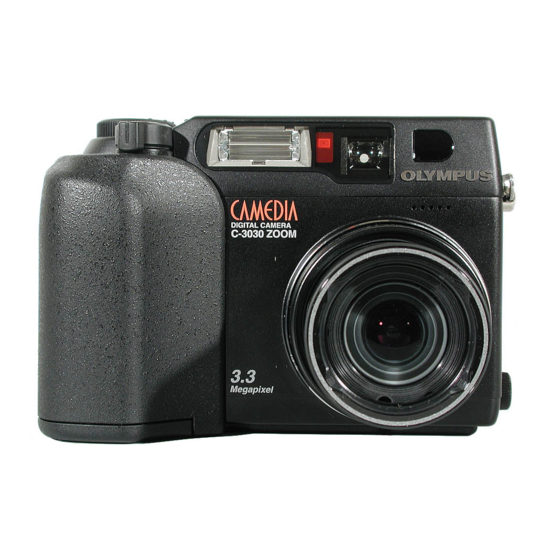Olympus CAMEDIA C-3030 Zoom Руководство - Страница 27
Просмотреть онлайн или скачать pdf Руководство для Цифровая камера Olympus CAMEDIA C-3030 Zoom. Olympus CAMEDIA C-3030 Zoom 30 страниц. External flash or strobes not firing with olympus cameras
Также для Olympus CAMEDIA C-3030 Zoom: Брошюра и технические характеристики (9 страниц), Быстрый старт (2 страниц), Устранение неполадок (3 страниц), Руководство по эксплуатации камеры (3 страниц)

Here you can select the number of thumbnail images to display and change the
brightness of the LCD's backlight.
Steve's Conclusion
The C-3030 Zoom represents a significant upgrade to Olympus' popular C-2020 Zoom.
The first difference you'll notice is the new, all-black body and larger finger grip but other
than that it looks a lot like the C-2020 Zoom. Inside is an updated 3.34 megapixel
imager and robust processing firmware. The C-2020 Zoom was one of the cameras that
we recommended without hesitation last year, the C-3030 Zoom will be in that elite
group this year. No matter what you want in the way of features this camera has got you
covered -- from point and shoot simplicity to full metered manual. It's small enough to
take with you wherever you go and light enough to hang around your neck all day.
A common statement made by folks seeing it for the first time was, "It doesn't look like a
digital camera." Hearing that I would turn it around and show them the picture I just took
on the color LCD. Even my semi-pro photography buddies were impressed with the
C-3030's features and image quality. Cameras like this when used with the new Epson
870 and 1270 photo printers will definitely put digital on the same level as film for
consumers who want to do it all at home.
The C-3030's larger finger grip gives it a more secure and stable feel in your hand. The
major controls like the mode/power dial, zoom lever and shutter button are
ergonomically placed and easy to operate. Particularly useful is the new Custom Mode
option where you can "dial in" your favorite combination of image size, quality,
operational mode, lens startup position, EV compensation, flash mode, and most every
other camera option available. This can be your startup default when you turn the
camera on which is very handy from power on to power off or during battery or memory
card changes.
Recording options are plentiful with a myriad of different combinations of still image
capture sizes (2048x1536, 1600x1200, 1280x960, 1024x768, 640x480) and
quality/compression settings (uncompressed TIFF, SHQ, HQ, SQ1 high, SQ1 normal,
SQ2 high, SQ2 normal). There's also the 320x240 and 160x120 QuickTime movie
modes at 15fps with sound. Movie recording time is limited only by the capacity of the
SmartMedia card you're using. The movies are sharp and clear but unfortunately you
can't use the optical zoom. Digital zoom is available but using it results in a not so nice,
pixelly looking picture.
Drive modes include: Single, Burst, AF Burst, AE Bracketing (3-5 frames with +/- 0.3,
0.6 or 1.0 stop increments), Selftimer and Remote. Burst mode is good for around 3fps
up to five JPEG-compressed pictures, it is not useable in TIFF mode. When using an
Olympus brand SmartMedia card there is also a special Panorama mode available. As
